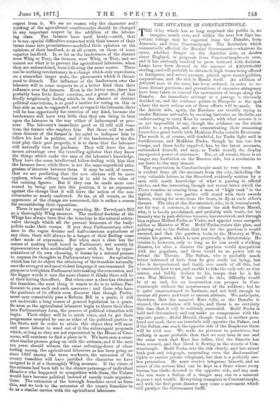THE SITUATION IN CONSTANTINOPLE. T HE delay which has so long
surprised the public is, we imagine, nearly over, and within the next few days im- portant tidings may be expected from the Danube, from Armenia, and from Constantinople. The hesitation which momentarily affected the Russian Government—whatever its cause, whether danger on the Austrian side, or doubts about England, or proposals from Constantinople—is over, and it has obviously resolved to press forward with decision. Loans have been decreed to the amount of £40,000,000 sterling, and will probably be obtained, high terms being offered to foreigners, and severe pressure placed upon municipalities, corporations, and the rich in Russia itself. An addition of 200,000 men to the army has been ordered, in order to re- lease distant garrisons, and precautions of excessive stringency have been taken to conceal the movements of troops along the Danube. An immediate attempt at a passage is obviously decided on, and the evidence points to Nicopolis as the spot where the most serious out of three efforts will be made. On the Asiatic side, again, the Russians are steadily trying to render Batoum untenable by erecting batteries on the hills, are endeavouring to carry Kars by assault, with what success it is as yet impossible to say, though the evidence on the whole points to a repulse, and are concentrating their remaining forces for a great battle with Mukhtar Pasha outside Erzeroum. The result is, of course, still doubtful, for Turks fight well in fortifications, and Mukhtar Pasha, though he has too few troops, and those badly supplied, has, by the latest accounts, entrenched himself, and may, as Turks usually do, display unexpected power of resistance. But, at all events, there is no longer any hesitation on the Russian side, but a resolution to use force to the very utmost.
The expectation in Constantinople must be very tense. It is evident from all the accounts from the city, including the very valuable letters in the Standard, evidently written by a man with much knowledge of what is passing in official circles, and the interesting though not recent letter which the Times vouches as coming from a man of "high rank" in the capital, that the two parties still stand with their swords drawn, waiting for news from the front, to fly at each other's throats. The idea of the discontented, who, be it remembered, are for war a ontrance, is to release the sick Sultan Murad, who, it is loudly proclaimed, and probably with truth, for his insanity was in part delirium tremens, has recovered, and through him replace Midhat Pasha as Vizier, and appoint some energetic soldier as Minister at War. Redif Pasha resists this plan, and pointing out to the Sultan that but for the garrison it would succeed, and that the garrison looks to the Ministry at War, retains his power, which is now practically a dictatorship. He retains it, however, only so long as he can avoid a striking disaster, for after a disaster the garrison would sympathise with the populace, and there would be no power left to defend the Throne. The Sultan, who is probably much better informed of facts than he gets credit for being, but who is inexperienced and timid, sees much of all this, but is uncertain how to act, and unable to take the only safe or wise course, and boldly declare to his troops that he is his own War Minister. If he could do this, difficulty would be at an end, for no insurrection can prosper in Con- stantinople without the acquiescence of the soldiers ; but he is quite unaccustomed to business, and not bold enough to assume all power and trust to unseen advisers. We anticipate, therefore, that the moment Kars falls, or the Danube is crossed, the revolution will begin, and there is no certainty this time that it will be suddenly successful. Redif Pasha is bold and determined, and can make no compromise with the opposite party ; Abdul Hamid, though timid, is neither para- lysed nor mad, there are ironclads still opposite the Palace, and if the Sultan can reach the opposite side of the Bosphorus there will be civil war. We make no pretence to prescience, but nothing is more probable than that we may hear in one and the same week that Kars has fallen, that the Danube has been crossed, and that blood is flowing in the streets of Con-
stantinople. Redif Pasha sees the risk clearly, and has seized both post and telegraph, suspending even the Ambassadors'
rights to receive private telegrams, but that is a perfectly use- less precaution. He must receive telegrams himself, and no secret of the serious kind can be kept in a State where every bureau has clerks devoted to the opposite side, and any man who can warn a Sultan of a danger may rise in a moment to power and wealth. Everything transpires in Constantinople, and with the first great disaster may come a movement which will paralyse the Government itself.


































 Previous page
Previous page